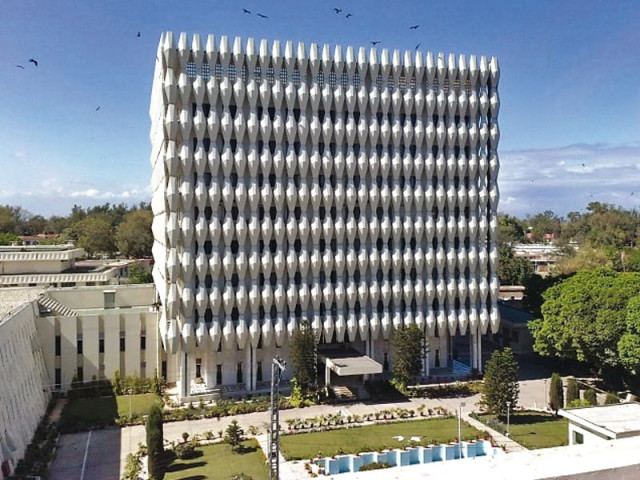Inviting investment: Sindh Bank to be listed on KSE ‘ideally’ before April
It has notched up profits every year since start of operations.

Sindh Bank has opened 200 branches within three years of its establishment. PHOTO: FILE
Sindh Bank will go public before the end of 2014, bank’s President and CEO Muhammad Bilal Sheikh told The Express Tribune in an interview.
Wholly owned by the government of Sindh, Sindh Bank will sell between 10% and 20% of its shares to the general public through the stock exchange ideally before April, Sheikh added.
“We’re in talks with Arif Habib Limited among others for the upcoming listing on the Karachi Stock Exchange,” he said, while referring to one of the leading investment banks of Pakistan.
“It’s my firm belief that ours is the best-run bank among all the comparable banks in Pakistan. That’s why I think the government of Sindh must get some premium by extending an offer for sale of shares,” he said.
Sindh Bank established its first branch in December 2010 with the central bank’s permission for the sole purpose of deposit mobilisation. It commenced formal operations in April 2011, which means it has still not completed three years of full-fledged banking business.

Still it has managed to turn in profits every year, which is quite an achievement for a new bank. Its pre-tax profit increased to Rs1.2 billion in 2012 compared to Rs1.1 billion at the end of 2011. However, the bank’s pre-tax profit was Rs950.1 million at the end of 2013, signifying a year-on-year drop of 26.1%.
“We’re the only Pakistani bank that has opened 200 branches within three years of its establishment,” Sheikh said, adding a rapid expansion in the branch network led to slowdown in the bank’s earnings in 2013.
According to unpublished management accounts of the bank for 2013, administrative expenses rose to Rs2.1 billion from Rs1.2 billion at the end of 2012, an increase of 67.8%.
However, the management is now aiming for consolidation by planning to open only 25 new branches in 2014. Sheikh believes doing so will strengthen the income statement by minimising administrative expenses.
“A branch reaches the break-even point when it mobilises deposits of at least Rs200 million,” he said.
Sixty-six out of 200 branches of the bank are located in Punjab and Khyber-Pakhtunkhwa. More surprisingly, over one-third of total deposits originated in Punjab alone, Sheikh said while emphasising that the bank’s deposit base is wide-ranging.
“Deposits of over Rs15 billion from Punjab reflects the trust that Sindh Bank enjoys in the country,” he said.
Reacting to the perception that the government of Sindh is propping up the bank’s deposits, Sheikh said the bank’s financial accounts are a testament to its sound deposit base. “It’s true the government of Sindh is supporting the bank, but its deposits constitute only a small part of the total deposits,” he said.
Sindh Bank’s deposits at the end of 2013 amounted to Rs45.7 billion. About Rs7.8 billion, or 17.2%, of that belonged to the government of Sindh.
Total deposits were Rs31.4 billion at the end of 2012, which reflects a phenomenal year-on-year increase of 45.4% during 2013. Similarly, advances grew from Rs19.2 billion in 2012 to Rs26.5 billion in 2013, showing a rise of 37.7%.
However, given the track record of most government-owned organisations, shouldn’t the public be wary of investing in a bank that is wholly owned and run by the government of Sindh? What about political pressure, for example, that may possibly force the bank to extend advances to non-viable entities, resulting in an infected loan portfolio?
“One of the sureties that I received from the board of directors upon my appointment as CEO was that Sindh Bank will not extend any long-term loan on a standalone basis. But the bank can participate according to its size and risk appetite if there is a syndicate,” Sheikh responded and said adopting this policy has practically nullified non-performing loans (NPLs).
According to another resolution passed by the board, Sindh Bank does not extend even short-term loans/working capital loans except against a pledge of commodities – such as sugar and cotton – or a mortgage on property. Moreover, the board has restricted the bank that mortgaged properties must be in upscale localities, such as Clifton, DHA, KDA and CDA, in order to ensure protection against default.
“I’m not worried about infected portfolio. As of today, Sindh Bank’s NPLs amount to zero,” Sheikh added.
Published in The Express Tribune, January 13th, 2014.
Like Business on Facebook, follow @TribuneBiz on Twitter to stay informed and join in the conversation.



















COMMENTS
Comments are moderated and generally will be posted if they are on-topic and not abusive.
For more information, please see our Comments FAQ